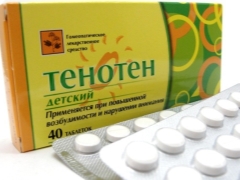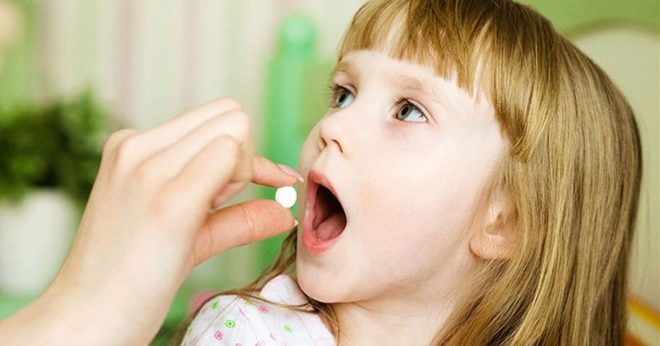Tenoten for children: instructions for use
Tenoten is a soothing homeopathic remedy, which is also referred to as nootropic drugs. It is often prescribed to adults with significant emotional and nervous stress, memory impairment, excessive anxiety, and increased irritability.
Especially for children Tenoten is produced for children. When is it shown to small patients and what are the healing effects in the child’s body? In which cases it is not worth giving it to children and what similar drugs can be replaced if taking Tenoten is impossible?
Release form
Children's tenoten is produced in the form of small white flat tablets of a round shape that need to be absorbed in the mouth (therefore, they have a sweet taste).
On one side of this medication there is a risk and you can consider the name of the manufacturer (MATERIA MEDICA). The second side also has a mark, thanks to which the medicine can be distinguished from the drug for adults - the inscription TENOTEN KID.
Tablets are placed in blisters of 20 pieces each and are sold in 1, 2 or 5 blisters in one box, which allows you to choose the medication for treatment courses with different duration.
Composition
The effect of Tenoten is due to specific antibodies to the S-100 protein, which is called brain-specific, since this protein is found only in brain cells. He participates in integrative activities, in particular, regulates the transmission of impulses between brain structures and combines various information. In addition, S-100 protein has the ability to protect brain cells from negative influences, for example, from toxic substances or oxygen deficiency.
There is no S-100 protein itself in Tenoten, but there are antibodies capable of firmly connecting with it after they enter the brain tissue. To obtain such antibodies, special biotechnology is used (it is called affinity purification), after which their 3-mg water-alcohol mixture is applied to milk sugar (lactose monohydrate).
The content of antibodies in children's medicine is estimated as 10-16 ng / g. In addition to such an active ingredient and lactose, the tablets also have magnesium stearate and microcrystalline cellulose, added to ensure that the preparation is solid and keeps its shape.
What is different from adult Tenoten?
Tenoten, which is prescribed to adults, is not used in patients younger than 18 years old, so if a remedy is prescribed for children, it is important not to confuse these two different medications. Tenoten for adults is also available in pill form, which in appearance is almost indistinguishable from children's medicine. However, on one side of this drug is only the inscription TENOTEN, and the word KID is absent.
In terms of their composition, at first glance, the medicines are identical, because the amount of the active ingredient in both products is 3 mg. But, if you look at the concentration of antibodies, it is clear that Tenoten for adults contains 10 times more active forms (their dilution is 10-15 ng / g). This is the difference between adult and child Tenoten.
Operating principle
Tenoten has several healing effects.
- The medicine has a calming effect and helps to reduce the tension of the nervous system.
- The drug is able to eliminate anxiety and fears (this effect is called anxiolytic).
- Tenoten is able to protect nerve cells under various negative influences, for example, during hypoxia or intoxication.
- When taking pills psycho-emotional stress is transferred more easily.
- The drug has a nootropic effect, is able to positively influence learning processes and improves memory.
- When brain damage occurs, the medication helps limit the area that has been affected.
- Under the influence of the drug fat peroxidation is inhibited.
- The medication also has antidepressant and anti-asthenic effects.
Indications
In childhood, Tenoten is often prescribed for hyperactivity and attention deficit disorder. In addition, this tool is prescribed to eliminate the symptoms of neurosis or autonomic disorders. The drug is in demand for increased anxiety, irritability, nervous excitability and behavior disorders.
The doctor can prescribe it to children who are experiencing some kind of stress, such as relocation, the start of school or the divorce of parents.
From what age is used?
As you can read in the annotations to the tablets, Tenoten is allowed to take children not earlier than 3 years. If a sedative or nootropic agent is required for patients who are not yet three years old, Tenoten is replaced with other drugs with a similar effect on the central nervous system, but allowed for infants in the first years of life.
Contraindications
Reception of Tenoten child is prohibited for young patients who have hypersensitivity to any of the ingredients of the tablets. Since there is lactose in the composition, the medicine is also not prescribed for hereditary disorders of carbohydrate metabolism, for example, for glucose-galactose malabsorption. Other contraindications for the appointment of such a drug are not available.
Side effects
Sometimes an individual intolerance reaction occurs on the pills, which can manifest itself as Quincke edema, an allergic rash, dry mouth, excessive sweating, abdominal distention and other symptoms. As a rule, such a negative reaction can be seen already after the first use of tablets. In this case, Tenoten immediately canceled. Other negative effects in the treatment of this tool usually do not reveal.
Instructions for use
Tenoten should be kept in the mouth (optimally - place the drug under the tongue) until the tablet is completely dissolved. The medicine is given to children between meals, so that the food does not affect the absorption of the active ingredient. If the child wants to eat, you can feed him 15-30 minutes after taking Tenoten. So that the drug does not provoke excessive activity at bedtime and problems with falling asleep, The last appointment should be at least 2 hours before the child goes to bed.
If the baby is difficult to dissolve the drug, it is permissible to dissolve it in a small volume of water (15-30 ml) and give the little patient to drink the resulting suspension. This method is chosen by many mothers of children 3-6 years old who are experiencing so that the baby does not accidentally choke on the pill.
If a child has been diagnosed with ADHD, Tenoten gives two tablets twice a day for 1-3 months. In other disorders and negative symptoms of the nervous system, the doctor chooses the dose and mode of use. In such cases, a single dose is often 1 tablet, and the frequency of administration can be from 1 to 3 times a day.
The duration of therapy can be up to 6 months, and if a second course is required, it is prescribed 1-2 months after the previous one is completed.
The minimum period for which Tenoten is prescribed is 4 weeks. If after taking for 1 month persistent improvements are not observed, the child should be shown to the doctor to select another drug.
Overdose
If you give the child more pills than the doctor prescribes and recommends the abstract to Tenoten, you may develop nausea and other symptoms of dyspepsia. In such a situation, the drug is canceled and monitored for the little patient. If the condition worsens, contact your pediatrician.
Interaction with other drugs
Tenoten is compatible with any other drugs and can be administered in combination with other nootropics, as well as with other groups of drugs.
Terms of sale and storage features
To buy a package of Tenoten for children in a pharmacy, it is not necessary to take a doctor's prescription, but a specialist's examination is desirable. The use of Tenoten and children like children in childhood is not recommended without a doctor's prescription. The average price of 40 tablets is 240 rubles.
The shelf life of the child drug is 3 years. If the date indicated on the box has expired, it must be discarded. Store the tablets at home in a dry place where small children will not get them. Storage temperature should not be above +25 degrees.
Parent reviews
On the use of Tenoten children can be found a lot of positive feedback. In them, mothers confirm that the pills helped to normalize the state of the child’s nervous system, decreased excitability, and saved from whims, aggression, and attacks of hysterics. According to parents, after the course of such a means, young patients less wake up at night, sleep better, learn new information more quickly, start to invent new games.
If the drug was discharged after a stressful impact or shock, its use contributed to getting rid of anxiety, nightmares, fears.
Since the tablet is sweet, most children do not protest against this remedy and take it with pleasure. Only occasionally the child does not want to keep the medicine in the mouth, but in such situations it helps the patient to make a suspension of the tablet.
The advantages of Tenoten include a small number of contraindications, as well as the extremely rare appearance of side effects.
However, about a third of all reviews of children's Tenoten are negative. In them, mothers complain about the lack of the desired effect or very weak improvements that disappear immediately after the completion of therapy. There are also mentions of an allergic reaction to tablets.
Some parents do not like the fact that the effect of treatment does not develop immediately, but the course of treatment is very long, because such a drug is prescribed for a period of at least one month.
Neurologists Reviews
Experts speak of Tenoten for children in different ways. Some doctors often use it in their practice and note improvements in patients after a course of treatment (elimination of fears, reduction of irritability, and so on).
Others trust only evidence-based medicine, according to which the effectiveness of Tenoten and other hypothetical remedies has not been proven. The well-known pediatrician Komarovsky belongs to this group of doctors.
Analogs
Replacing Tenoten may be other drugs with a similar effect on the nervous system of the child, for example:
- Anvifen. This drug contains aminophenylbutyric acid and is available in capsules with different dosages. Children are prescribed it, as well as Tenoten, not earlier than 3 years of age. Analogues of such drugs are drugs Phenibut and Noofen.
- Pantocalcin This medication based on hopantenic acid is also used in children over 3 years old, and younger patients are prescribed its analogue - syrup Pantogam, which can be given from 1 year.
- Glycine. Such tablets can be given from birth. Like children's Tenoten, they are absorbed in the oral cavity.
- Semax. These nasal drops with a concentration of 0.1% are prescribed for children over 7 years old.
- Adaptol. The basis of such pills is mebicar. Although the instruction to them includes, in contraindications, a child's age, neurologists may prescribe such a drug from 9-10 years old if there are grounds for this.
- Aminalon. The effect of the use of such tablets is provided by their main component - GABA. The drug is prescribed to children older than a year.
- Cortexin. This tool is represented only by the injection form, but can be used from birth and even in premature babies.
- Afobazole. This drug, containing fabomotisol, is contraindicated in children, but if seriously indicated, neuropathologists may prescribe it to patients over 10–12 years of age.
These and other substitutes for Tenoten have a positive effect on the state of the brain and mental activity, but they have their own contraindications and features of treatment, so the choice of analogue should be made only with a specialist who observes the child.
What is hyperactivity - is it a manifestation of the disease or just a character? How to behave with a hyperactive child? Do I need to give a sedative? These and other questions will be answered by Dr. Komarovsky in the next video.


























